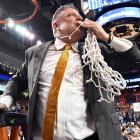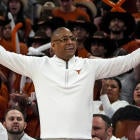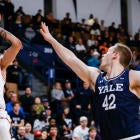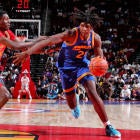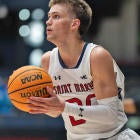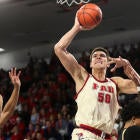There was a time, back during the season -- after an FBI investigation had led to Chuck Person's arrest, but before Auburn had won a share of its first SEC title in 18 years -- when it appeared Bruce Pearl's time coaching the Tigers was on the verge of running out. Neither I, nor anybody else, ever reported Pearl was definitely done because nothing was ever that concrete. But just trust me when I tell you there weren't many industry sources who believed Pearl would survive -- especially after the athletic director who hired him, Jay Jacobs, was forced to resign just a week before the season started.
Which is why Monday's news was so remarkable.
Pleased to announce we've extended the contract of @coachbrucepearl to lead @AuburnMBB through 2023.#WarEagle https://t.co/tJLOHbUi5a
— Auburn Tigers (@AuburnTigers) June 4, 2018
Yep, you read that correctly. Bruce Pearl's contract has been extended. So not only did he survive against most odds, Pearl actually ended up in a better spot than he was before his associate head coach was charged with six federal crimes for providing impermissible benefits to multiple student-athletes. And that's quite the plot twist, isn't it?
Pearl now has more years and more money.
Person's trial is scheduled to begin in February.
So, absolutely, this extension is a surprise based on where we were in November and December. But it's not terribly shocking in real time considering Pearl A) just won 26 games and an SEC regular-season title, B) has a top-10 team set to return, and C) has never been implicated in anything as it pertains to this specific case other than that he employed someone who broke NCAA rules for his own personal benefit.
And that's important to note.
What allegedly happened at Arizona, for instance, is not the same as what allegedly happened at Auburn, which, I think, is worth pointing out because it's often lost on many. At Arizona, what the FBI has alleged is that former associate head coach Book Richardson accepted money from outside influences and then used some of it to buy high school prospects -- which, if true, means Arizona and Sean Miller both benefitted from Richardson's illegal/improper actions.
But that's not really the case at Auburn.
Person, yes, similarly accepted money from an outsider. But the allegations there are not that he used the estimated $91,000 to lure anybody to Auburn's campus. Instead, the allegations are that he used the money to create influence over players already on campus so that he could theoretically steer them to a certain financial adviser whenever they became professionals. In other words, Pearl did not obviously benefit from Person's violations the way Miller allegedly benefitted from Richardson's violations -- which is why it's not unreasonable to believe Pearl really might not have known what Person was allegedly doing.
When I spoke with Pearl last week, this is something he cited as a root of frustration. If you want to blame him for employing somebody who broke NCAA rules, Pearl suggested, that's fine and understandable. He doesn't hide from that responsibility. But the facts of the case, as they're currently known, indicate no personal wrongdoing or knowledge of wrongdoing. And that's something that not everybody seems to understand about Auburn's situation. Again, it's not the same as Arizona's situation. If Richardson did what he's accused of doing, Arizona, as a team, and Miller, as a coach, benefitted from his violations. But the only people who benefitted from Person's violations are Danjel Purifoy, Austin Wiley and Person himself.
Pearl didn't obviously gain anything.
Auburn didn't obviously gain anything.
So what school administrators have done is basically double-down on the idea that the worst for Auburn Basketball is behind Auburn Basketball, that the best might still be on the way, and that, either way, Bruce Pearl didn't have anything to do with anything.
It'll lead to eye-rolls from some corners, for sure.
But, all things considered, the program will likely be better for it.












